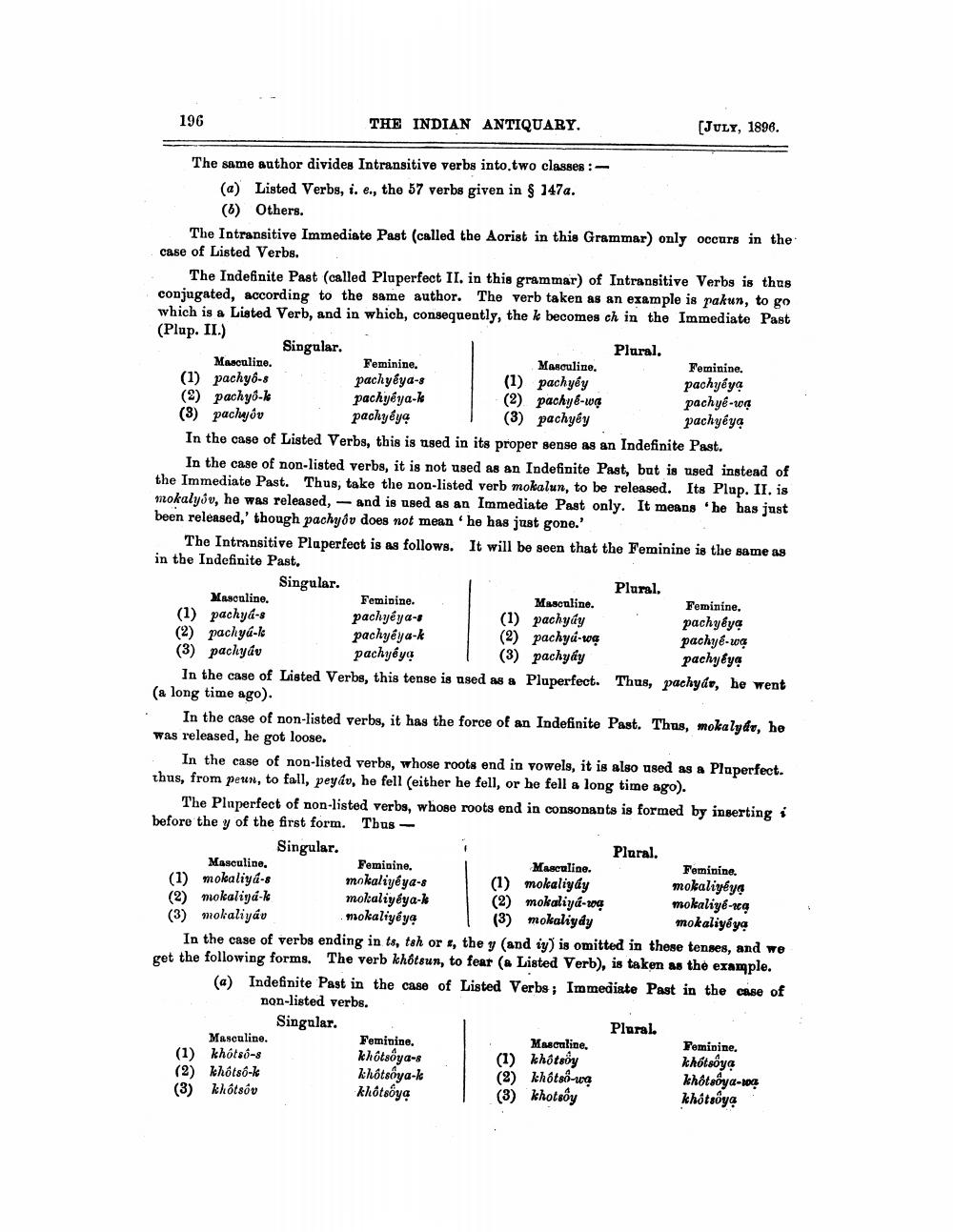________________
196
THE INDIAN ANTIQUABY.
(JULY, 1896.
The same author divides Intransitive verbs into two classes :
(a) Listed Verbs, i. e., the 57 verbs given in § 147a.
(6) Others. The Intransitive Immediate Past (called the Aorist in this Grammar) only occurs in the case of Listed Verbs.
The Indefinite Past (called Pluperfect II, in this grammar) of Intransitive Verbs is thus conjugated, according to the same author. The verb taken as an example is pakun, to go which is a Listed Verb, and in which, consequently, the ke becomes ch in the Immediate Past (Plup. II.) Singular.
Plural. Masculine. Feminine.
Masculine.
Feminine. (1) pachy6-8
pachy@ya-8 (1) pachyby
pachyéya (8) pachys-k
pachy@ya(2) pachy6-wa
pachyé-roa (3) pachejov
packyéyo (3) pachyéy
pachyéya In the case of Listed Verbs, this is used in its proper sense as an Indefinite Past.
In the case of non-listed verbs, it is not used as an Indefinite Past, but is used instead of the Immediate Past. Thus, take the non-listed verb mokalun, to be released. Its Plup. II. is mokalyov, he was released, and is used as an Immediate Past only. It means 'he has just been released,' though pachyov does not mean he has just gone.'
The Intransitive Plaperfect is as follows. It will be seen that the Feminine is the same as in the Indefinite Past. Singular.
Plural. Masculine. Feminine.
Masculine.
Feminine. (1) pachyd-8
pachyéya-s (1) pachyáy
pachy@ya (2) pachyu-l pachyéya-k
pachya-xog
pachyé-woo (3) pachyáv
pachayềựa (3) pachyay
pachy@ya In the case of Listed Verbs, this tense is used as a pluperfect. Thus, pachyár, he went (a long time ago).
In the case of non-listed verbs, it has the force of an Indefinite Past. Thus, mokalydt, he was released, he got loose.
In the case of non-listed verbs, whose roots end in vowels, it is also used as a Plaperfect. thus, from peon, to fall, peyao, he fell (either he fell, or he fell a long time ago).
The Pluperfect of non-listed verbs, whose roots end in consonants is formed by inserting i before they of the first form. Thus - Singular.
Plural. Masculine. Feminine.
Masculine.
Feminine. (1) mokaliya-s
mokaliyéya-8 (1) mokaliyáy
mokaliyéya (2) mokaliya-k mokaliyéya-k
mokaliyá-20g mokaliye-ca (3) mokaliyáo
mokaliyéya (3) mokaliydy
mokaliyéya In the case of verbs ending in ts, tsh ors, they (and iy) is omitted in these tenses, and we get the following forms. The verb khôtsun, to fear (a Listed Verb), is taken as the example.
(a) Indefinite Past in the case of Listed Verbs ; Immediate Past in the case of
non-listed verbs. Singular.
Plural Masculine. Feminine.
Masculine.
Feminine. (1) khótsó-s
khôtsôya-s (1) khôtsổ
khớtsông (2) khôtsó-k
khôts@ya-k (8) khôtsô-ug
khôtôd-toa (3) khôt sốt
khôt sống (3) khot công
khôtôva




